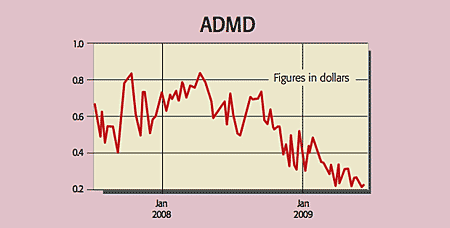
North America is in the throes of a grave medical crisis. Doctors have already been forced to ration tests for cancer at hospitals from Chicago to Southern California. A prolonged shortage could halt clinical trials for life-saving drugs, Dr Peter Conti of the University of Southern California told Reuters.
Each year, 18 million procedures using medical isotopes are performed in America. Sourced from decayed uranium in a nuclear plant, they changed the face of medicine when first introduced to US hospitals in 1957. Injected into the body, the isotopes give off energy that can be detected by imaging equipment. For the first time, doctors had a clear view of how a complex organ such as the heart functions, allowing them to identify potential heart problems or to uncover whether cancer has spread. Today, the particles are also used to irradiate tumours and make drugs.
It was the closure of a nuclear plant in Chalk River, Ontario, which started the crisis. Last month, Canadian health officials shut the reactor after noticing a leak. The Chalk River plant is one of only five ageing reactors that produces molybdenum-99 (moly-99), the most commonly used medical isotope. It accounts for 40% of the global market for medical isotopes. But repairs that were meant to take a month may now take three. And moly-99 has a half-life of just 67 hours, making it impossible to stockpile. So a scramble for emergency supplies has ensued.
Two reactors had been purposely built as replacements for Chalk River. But Canadian prime minister Stephen Harper recently mothballed the plants and said Canada was getting out of the isotopes business. The reactors – Maple 1 and Maple 2 – had been under construction for well over a decade and had cost the state more than C$500m. They should have gone into service in 2000, and Harper finally decided to cut the state’s losses.
The scientists behind the reactors claim they were just four months away from final testing and that the plants would have made more than enough isotopes to satisfy global demand. It may be that Harper, a Conservative, plans to privatise the project. But even if Maple 1 and 2 return under new ownership, it won’t be long before there’s a fresh shortage of isotopes. Half the world’s reactors are between 40 and 49 years old.
And no new reactors are expected to come online until the middle of next decade, says CBC News. Governments continue to block their construction, fearful of the prospect of losing isoptopes to terrorists – it wouldn’t take much to produce powerful bombs from the heavily enriched material.
Meanwhile, demand for medical isotopes is growing at 5%-7% a year. There are alternatives to moly-99. Bone scan images, for example, can be performed with a lower dose of F-18 fluoride. But these alternatives are more costly, invasive and not as accurate, says the University of Chicago Medical Center. The best alternative for US doctors in the meantime may be to use PET scans (see below).
These procedures are costly and not covered by Medicare. But because they use isotopes sourced from particle accelerators called cyclotrons, you don’t have the security and scarcity issues you have with nuclear reactors. Nevertheless, a solution must be found fast. As Christopher O’Brien of the Ontario Association of Nuclear Medicine told CBC News: “We’re teetering on the brink of disaster.”
The best bet in the sector
The decision to shut down the Maple reactors has left medical isotope groups scrabbling to secure new supplies. For the US, the nearest-term solution, according to Dr Robert Atcher, president of the Society of Nuclear Medicine, is for the US Department of Energy to convert a research reactor at the University of Missouri to medical isotopes. And that’s what’s happening. This week, Advanced Medical Isotope Corporation (Pink Sheets: ADMD) signed a landmark deal with the University of Missouri to produce moly-99 isotopes using its cyclotron facility, which is expected to come into operation in two to four years’ time.
The total retail market for moly-99 in the States is over $1m a week, says CEO James Katzaroff. Advanced Medical would be the first US company supplying the home market. In the meantime, it also produces isotopes for PET imaging. These producers have seen double-digit growth in America and will benefit while the moly-99 isotope supply is under threat.
A word of warning though. Advanced Medical trades on the over-the-counter (OTC) market in the US – the Pink Sheets – so the stock is very illiquid and highly risky. You can buy the stock through Killick (tel: 020-7337 0520).